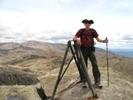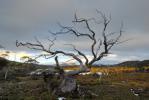Three Capes Walk Proposal
Forum rules
Tasmania specific bushwalking discussion. Please avoid publishing details of access to sensitive areas with no tracks.
Tasmania specific bushwalking discussion. Please avoid publishing details of access to sensitive areas with no tracks.
Three Capes Walk Proposal
Just a belated heads up re the above. I only noticed it this morning after finally reading an email newsletter I received from Wild magazine a few days ago, and realised the urgency should anyone want to make a submission.
Please any provide feedback on the proposal to PWS as per the link below.
(Also please keep any replies to this post non-political so as to remain within the forum rules...have run the content past Nik and he is happy for it to be posted)
Public submissions to TPWS on the 3 Capes Track proposal on the Tasman Peninsula close today 11 March (I assume that means until midnight but could be wrong).
I very quickly gleaned through parts of the (118 page) proposal document. It appears to be a 5 or 6 day walk, along the lines of the Overland Track, but seems very commercially focused with several large lodges providing mattresses and cooking facilities.
The proposal seems to be keen on it being a year round operation due to the milder climate in that area. The proposed economics indicate that they believe that they can charge $200 per person, year round, to walk it. I would think that local bushwalkers may be upset by that.
Links for further info:
Proposal and feedback to PWS:
http://www.parks.tas.gov.au/publications/tech/tasman/feedback.html
Wild magazine news:
http://www.wild.com.au/resources/news.aspx?article_guid=5FA2818B-84A6-4F00-A819-7248D83BF2FB
Tasmania National Parks Association info and position:
http://www.tnpa.asn.au/news.html
http://www.tnpa.asn.au/news/threecapes/summary.pdf
A related post from some time ago that I found:
http://bushwalk.com/forum/viewtopic.php?f=5&t=166&p=862&hilit=3+capes#p862
Kind regards,
JohnW
Please any provide feedback on the proposal to PWS as per the link below.
(Also please keep any replies to this post non-political so as to remain within the forum rules...have run the content past Nik and he is happy for it to be posted)
Public submissions to TPWS on the 3 Capes Track proposal on the Tasman Peninsula close today 11 March (I assume that means until midnight but could be wrong).
I very quickly gleaned through parts of the (118 page) proposal document. It appears to be a 5 or 6 day walk, along the lines of the Overland Track, but seems very commercially focused with several large lodges providing mattresses and cooking facilities.
The proposal seems to be keen on it being a year round operation due to the milder climate in that area. The proposed economics indicate that they believe that they can charge $200 per person, year round, to walk it. I would think that local bushwalkers may be upset by that.
Links for further info:
Proposal and feedback to PWS:
http://www.parks.tas.gov.au/publications/tech/tasman/feedback.html
Wild magazine news:
http://www.wild.com.au/resources/news.aspx?article_guid=5FA2818B-84A6-4F00-A819-7248D83BF2FB
Tasmania National Parks Association info and position:
http://www.tnpa.asn.au/news.html
http://www.tnpa.asn.au/news/threecapes/summary.pdf
A related post from some time ago that I found:
http://bushwalk.com/forum/viewtopic.php?f=5&t=166&p=862&hilit=3+capes#p862
Kind regards,
JohnW
John W
In Nature's keeping they are safe, but through the agency of man destruction is making rapid progress - John Muir c1912
In Nature's keeping they are safe, but through the agency of man destruction is making rapid progress - John Muir c1912
-

johnw - Lagarostrobos franklinii

- Posts: 9688
- Joined: Wed 23 Jan, 2008 11:59 am
- Location: Macarthur Region - SW Sydney
- Region: New South Wales
- Gender: Male
Three Capes Walk Proposal
As most bushwalkers would know there is a proposal from PWS to develop a Three Capes Walk in Tasman NP. Now it seems to me it would be of interest to know what subscribers to Bushwalk-Tas felt about it.
Of course the problem is likely to be what is considered political . I guess there is no doubt it involves the rule " ...not.. for or against any particular issue ...." but then these issues can have a significant impact on bushwalkers, so it is good to talk about them.
I think it was Nik who asked about creating a section in the forum for so called political issues so I will wait with interest to see the acceptability or otherwise of this topic.
Of course the problem is likely to be what is considered political . I guess there is no doubt it involves the rule " ...not.. for or against any particular issue ...." but then these issues can have a significant impact on bushwalkers, so it is good to talk about them.
I think it was Nik who asked about creating a section in the forum for so called political issues so I will wait with interest to see the acceptability or otherwise of this topic.
Peter
My bushwalks pages
My bushwalks pages
-

PeterJ - Athrotaxis cupressoides

- Posts: 428
- Joined: Mon 24 Sep, 2007 5:06 pm
- Location: Lenah Valley
- Region: Tasmania
- Gender: Male
Re: Three Capes Walk Proposal
Hi folks,
Personally I dont think the proposal is the best for the walking fraternity (either local or visitors). I think it looks way too much like a Milford Track proposal and I suspect that PWS will not be able to afford to build either the required length of track or the accommodation as proposed. I reckon it will turn in to a compromise with part of the track being completed by PWS and a private operator building huts for which walkers will pay top price to stay overnight.
To me, the best point of difference about Tasmanian walking as against Milford Track type walks is that its basically you against the elements in Tassie. I would prefer that we educate walkers about the challenges here, and the benefits of rising to that challenge, rather than "urbanising" the wilder areas. I have no problem with hardening campsites to prevent damage but at least with that level of development there is still a high level of personal responsibility to ensure you have good gear, experience and the stamina to challenge yourself against mother nature.
Cheers - Phil
Personally I dont think the proposal is the best for the walking fraternity (either local or visitors). I think it looks way too much like a Milford Track proposal and I suspect that PWS will not be able to afford to build either the required length of track or the accommodation as proposed. I reckon it will turn in to a compromise with part of the track being completed by PWS and a private operator building huts for which walkers will pay top price to stay overnight.
To me, the best point of difference about Tasmanian walking as against Milford Track type walks is that its basically you against the elements in Tassie. I would prefer that we educate walkers about the challenges here, and the benefits of rising to that challenge, rather than "urbanising" the wilder areas. I have no problem with hardening campsites to prevent damage but at least with that level of development there is still a high level of personal responsibility to ensure you have good gear, experience and the stamina to challenge yourself against mother nature.
Cheers - Phil
-

tastrax - Lagarostrobos franklinii

- Posts: 2032
- Joined: Fri 28 Mar, 2008 6:25 pm
- Location: What3words - epic.constable.downplayed
- ASSOCIATED ORGANISATIONS: RETIRED! - Parks and Wildlife Service
- Region: Tasmania
Re: Three Capes Walk Proposal
I've created the new 'Controversy Corner' forum, and moved this topic to the new forum. This will allow this topic (and others) to include subject matter that was previously banned by the forum rules. I'm not suggesting that this topic is necessarily controversial, but it may have the potential to be both controversial and political (and besides... I need to have something in the new forum!  ).
).
NB: I've also merged in the first post in this topic from another separate topic, as it is about the same issue, and also links to a lot of relevant information.
NB: I've also merged in the first post in this topic from another separate topic, as it is about the same issue, and also links to a lot of relevant information.
- Son of a Beach
- Lagarostrobos franklinii

- Posts: 6929
- Joined: Thu 01 Mar, 2007 7:55 am
- ASSOCIATED ORGANISATIONS: Bit Map (NIXANZ)
- Region: Tasmania
- Gender: Male
Re: Three Capes Walk Proposal
I was initially worried that the Three Capes Walk would bar people camping privately in the area and went to see the PWS officer handling the project about that. He agreed to resolve that issue and we also discussed the toilet problem at Perdition Ponds. Not sure what will be the result of that. If the new track and facilities are done properly I don’t think they will cause a serious problem, so I guess I don’t fully agree with position of some of the objectors on this.
I am uncomfortable with the argument of opposing spending taxpayers money on this project while at the same time wanting money spent on other tracks. I know not enough is spent on tracks as a whole, but I just get the feeling that the position sounds like it is OK to spend money on tracks for locals but not for visiting walkers that would be the target of advertising etc.
If you set aside the huts, the actual track proposed is much the same concept that has been advocated by many of the Tasman locals involved in developing walks (see the proposal by Peter & Shirley Story in Peninsula Tracks 1996 page 63 on a walk down the coast and via C Pillar starting from “Marion Narrows and terminate at White Beech near Nubeena”.
I have been very disgusted with what would have to be a minority of walkers because of the mess they leave behind. Just on the Tasman we found someone had gone to the toilet in the middle of the campsite just south of Tatnells Hill and on the Cape Pillar walk a pile of toilet paper lying on the track and tissues were noted at Perdition Ponds. So apart from an educational campaign what should be done and one of these is to provide facilities and should they be combined with camping platforms or properly managed campsites. The option chosen by PWS for Tasman seems to be huts and so if the local walker overnight issue is fixed it comes down to how strongly one feels about huts.
I am uncomfortable with the argument of opposing spending taxpayers money on this project while at the same time wanting money spent on other tracks. I know not enough is spent on tracks as a whole, but I just get the feeling that the position sounds like it is OK to spend money on tracks for locals but not for visiting walkers that would be the target of advertising etc.
If you set aside the huts, the actual track proposed is much the same concept that has been advocated by many of the Tasman locals involved in developing walks (see the proposal by Peter & Shirley Story in Peninsula Tracks 1996 page 63 on a walk down the coast and via C Pillar starting from “Marion Narrows and terminate at White Beech near Nubeena”.
I have been very disgusted with what would have to be a minority of walkers because of the mess they leave behind. Just on the Tasman we found someone had gone to the toilet in the middle of the campsite just south of Tatnells Hill and on the Cape Pillar walk a pile of toilet paper lying on the track and tissues were noted at Perdition Ponds. So apart from an educational campaign what should be done and one of these is to provide facilities and should they be combined with camping platforms or properly managed campsites. The option chosen by PWS for Tasman seems to be huts and so if the local walker overnight issue is fixed it comes down to how strongly one feels about huts.
Peter
My bushwalks pages
My bushwalks pages
-

PeterJ - Athrotaxis cupressoides

- Posts: 428
- Joined: Mon 24 Sep, 2007 5:06 pm
- Location: Lenah Valley
- Region: Tasmania
- Gender: Male
Re: Three Capes Walk Proposal
Just released apparently -
http://www.rpdc.tas.gov.au/plu/dmprevie ... _plan_2008
Happy reading - lots of reading...
http://www.rpdc.tas.gov.au/plu/dmprevie ... _plan_2008
Happy reading - lots of reading...
-

tasadam - Magnus administratio

- Posts: 5900
- Joined: Tue 10 Apr, 2007 6:58 pm
- Location: Near Devonport, Tasmania
- ASSOCIATED ORGANISATIONS: TasmaniART, Smitten Merino, Macpac
- Region: Tasmania
- Gender: Male
Re: Three Capes Walk Proposal
Only problem is, by the time you've finished reading all that the RPDC may well be history 
“No man ever steps in the same river twice, for it is not the same river and he is not the same man.” -Heraclitus
-

Singe - Athrotaxis cupressoides

- Posts: 238
- Joined: Wed 30 Apr, 2008 4:45 pm
- Region: New South Wales
- Gender: Male
Re: Three Capes Walk Proposal
http://www.themercury.com.au/article/20 ... -news.html
"Though 214 of the 247 submissions opposed the project, the RPDC approved the proposed amendments"
My calculations make that about 87% in oposition to the proposal... I wonder what kind of response is needed for the RPDC to actually turn down a project?
Glad to know my 0.40% was a valuable addition to the process...
"Though 214 of the 247 submissions opposed the project, the RPDC approved the proposed amendments"
My calculations make that about 87% in oposition to the proposal... I wonder what kind of response is needed for the RPDC to actually turn down a project?
Glad to know my 0.40% was a valuable addition to the process...
-

kramster - Athrotaxis cupressoides

- Posts: 234
- Joined: Wed 05 Dec, 2007 10:18 am
- Location: Hobart, Tasmania
- Region: Tasmania
- Gender: Male
Re: Three Capes Walk Proposal
This proposal is @#$!%*^ and has no ^&%#@$(^@ merit.
OK now it belongs in controversy corner.
P.S. As an aside to the 700m post by Tasadam, a drive into Fortesque Bay will show massive amounts of logging induced degradation butting up to the only tourist road to a magnificent national park area, now that has to be controversial!
OK now it belongs in controversy corner.
P.S. As an aside to the 700m post by Tasadam, a drive into Fortesque Bay will show massive amounts of logging induced degradation butting up to the only tourist road to a magnificent national park area, now that has to be controversial!
The idea of wilderness needs no defense, it only needs defenders ~ Edward Abbey
-

stepbystep - Lagarostrobos franklinii

- Posts: 7625
- Joined: Tue 19 May, 2009 10:19 am
- Location: Street urchin
- Region: Tasmania
- Gender: Male
Re: Three Capes Walk Proposal
kramster wrote:My calculations make that about 87% in oposition to the proposal... I wonder what kind of response is needed for the RPDC to actually turn down a project?
Forestry have to say 'no'.
"Mit der Dummheit kämpfen Götter selbst vergebens."
-

north-north-west - Lagarostrobos franklinii

- Posts: 15493
- Joined: Thu 14 May, 2009 7:36 pm
- Location: The Asylum
- ASSOCIATED ORGANISATIONS: Social Misfits Anonymous
- Region: Tasmania
Re: Three Capes Walk Proposal
Just to play the devils advocate with the stats being quoted, people with an opposition to a project are far more likely to send a submission in as opposed to people who are happy for it to go ahead. And on that point (of stats), how many of the 87% were a broad repeated objection to any form of development within parks (which is an objection to policy rather than this individual project as such), rather than a specific objection relating to this project.
I have no affiliation to the project btw, but I do think that from time to time commercial operators in parks are given a hard time when being painted with a broader brush of personal and philosophical ideals.
Daniel.
I have no affiliation to the project btw, but I do think that from time to time commercial operators in parks are given a hard time when being painted with a broader brush of personal and philosophical ideals.
Daniel.
- RiverFly
Re: Three Capes Walk Proposal
RiverFly wrote:...how many of the 87% were a broad repeated objection to any form of development within [national] parks...
When it comes to the spirit of international conventions related to National Parks, I'm not sure this isn't a reasonable position to take. ie. Objecting to any development in a National Park seems reasonable to me.
-

woka - Athrotaxis cupressoides

- Posts: 106
- Joined: Sun 11 May, 2008 7:47 pm
- Location: Kingston, Tasmania
- Region: Tasmania
Re: Three Capes Walk Proposal
I'm not sure this isn't a reasonable position to take. ie. Objecting to any development in a National Park seems reasonable to me.
You could just as easily counter that by debating that excluding commercial operators from NP's is discriminatory against a significant proportion of the population who rely on guides to facilitate access and recreation within these areas. This group of users otherwise wouldn't be able to use the parks as a result of a lack of skills, experience and/or access to equipment.
The above arguement also counters the arguement that commercial operations are exclusive. In my opinion (as a guide who operates outside of NP's) the fact is to the contrary. Commercial operators facilitate access to NP's that otherwise wouldn't be available to those who weren't lucky enough to learn the skills required to bushwalk, or those that don't have the gear to do it properly. A once in a lifetime $1500-$2500 trip is no more financially exclusive than the $1500-$2000+ worth of gear and experience independant recreational walkers take with them into the parks.
Food for thought from the otherside of the fence.
- RiverFly
Re: Three Capes Walk Proposal
Contents removed by poster
Last edited by Ent on Fri 12 Nov, 2010 8:41 am, edited 1 time in total.
"lt only took six years. From now on, l´ll write two letters a week instead of one."
(Shawshank Redemption)
(Shawshank Redemption)
-

Ent - Lagarostrobos franklinii

- Posts: 4059
- Joined: Tue 13 May, 2008 3:38 pm
- Region: Tasmania
Re: Three Capes Walk Proposal
RiverFly wrote:I'm not sure this isn't a reasonable position to take. ie. Objecting to any development in a National Park seems reasonable to me.
You could just as easily counter that by debating that excluding commercial operators from NP's is discriminatory against a significant proportion of the population who rely on guides to facilitate access and recreation within these areas. This group of users otherwise wouldn't be able to use the parks as a result of a lack of skills, experience and/or access to equipment.
Yes, exactly! I think both are valid points of view. Opposing in many (most?!) ways, but still equally valid.
-

woka - Athrotaxis cupressoides

- Posts: 106
- Joined: Sun 11 May, 2008 7:47 pm
- Location: Kingston, Tasmania
- Region: Tasmania
Re: Three Capes Walk Proposal
RiverFly wrote:I'm not sure this isn't a reasonable position to take. ie. Objecting to any development in a National Park seems reasonable to me.
You could just as easily counter that by debating that excluding commercial operators from NP's is discriminatory against a significant proportion of the population who rely on guides to facilitate access and recreation within these areas. This group of users otherwise wouldn't be able to use the parks as a result of a lack of skills, experience and/or access to equipment.
The above arguement also counters the arguement that commercial operations are exclusive. In my opinion (as a guide who operates outside of NP's) the fact is to the contrary. Commercial operators facilitate access to NP's that otherwise wouldn't be available to those who weren't lucky enough to learn the skills required to bushwalk, or those that don't have the gear to do it properly. A once in a lifetime $1500-$2500 trip is no more financially exclusive than the $1500-$2000+ worth of gear and experience independant recreational walkers take with them into the parks.
Food for thought from the otherside of the fence.
I'd have a hard time accepting that anyone without a barrow to push would seriously apply the term discrimination to this argument... frankly I think that people who do experience genuine discrimination would be rightly offended by your misappropriation of the term! To say that people who choose not to access remote areas due to the discomfort and/or expense entailed by the lack of facilities are being discriminated against is like saying people who don't like getting sandy or wet are being discriminated against by the government failing to pour concrete over the beach.
It's really a red herring though, as the objections in the submissions that I have read aren't to commercial operators at all, but rather inappropriate development in an area which is protected due to its natural values. As you're no doubt aware, many successful commercial operators exist in areas with only very basic facilities, and a negligible environmental footprint; to my way of thinking, this type of operation is far better suited to a National Park than the three peaks proposal as it stands.
“No man ever steps in the same river twice, for it is not the same river and he is not the same man.” -Heraclitus
-

Singe - Athrotaxis cupressoides

- Posts: 238
- Joined: Wed 30 Apr, 2008 4:45 pm
- Region: New South Wales
- Gender: Male
Re: Three Capes Walk Proposal
Overall the project looks fine, the route good, the upgrades ok. I don't like privately operated huts in national parks in any form and the cost/return is a huge gamble.
Last edited by Nuts on Thu 23 Jul, 2009 12:02 pm, edited 1 time in total.
-

Nuts - Lagarostrobos franklinii

- Posts: 8555
- Joined: Sat 05 Apr, 2008 12:22 pm
- Region: Tasmania
Re: Three Capes Walk Proposal
To say that people who choose not to access remote areas due to the discomfort and/or expense entailed by the lack of facilities are being discriminated against is like saying people who don't like getting sandy or wet are being discriminated against by the government failing to pour concrete over the beach.
My statements are in reference to the stats on the objections being used, and the broader role of commercial operators within our parks. My discrimination statement is in reference to the reverse arguement that is well entrenched in the anti-commercial arguement - that is, commercial huts, standing camps etc within the parks are exlusionary and should never be allowed. I strongly disagree with this arguement (based on my proffession and experience as a fly fishing guide). My arguement is that commercial facilities within parks are inclusive, facilitating a new group to enjoy our parks and culture. These customers otherwise wouldn't be capable of enjoying the parks we enjoy, because of lack of experience, lack of fitness, lack of mentors in an increasingly urbanised population, and lack of time. A huge proportion of Australians fall into the later categories.
As for my comments relating to general and broad objections to commercial operators in parks (rather than specific environmental concerns of individual projects etc), the last round of submissions relating to the last revision of the WHA Management Plan consist in a major part of just these type of broader philosophical objections.
Just to re-iterate, I have nothing to do with the Three Capes proposal etc. Just providing feedback from the commercial side of the fence to balance the arguement.
Last edited by RiverFly on Thu 23 Jul, 2009 11:41 am, edited 1 time in total.
- RiverFly
Re: Three Capes Walk Proposal
I don't particularly agree with one side or the other here and Singe may correct me if I'm wrong, but I think that his analogy still stands, as people who are unable to use the beach (eg, because they find it difficult to walk through sand due to short legs, or wheelchairs, or a silica allergy), would need a whole lot of infrastructure put in place, in order to be able to use the beach better (eg, concrete over all the sand).
It's an extreme example, but I guess it helps to illustrate the point.
I think that what he's getting at, is that if people who are not capable of using these areas without the help of substantial infrastructure are assisted by the building of such infrastructure, then it is to the detriment of all the people who are capable of using the areas without such infrastructure, because the infrastructure itself detracts from what makes the areas so special in the first place.
I'm not trying to take sides one way or the other, but just trying to see if I understand the argument correctly.
It's an extreme example, but I guess it helps to illustrate the point.
I think that what he's getting at, is that if people who are not capable of using these areas without the help of substantial infrastructure are assisted by the building of such infrastructure, then it is to the detriment of all the people who are capable of using the areas without such infrastructure, because the infrastructure itself detracts from what makes the areas so special in the first place.
I'm not trying to take sides one way or the other, but just trying to see if I understand the argument correctly.
- Son of a Beach
- Lagarostrobos franklinii

- Posts: 6929
- Joined: Thu 01 Mar, 2007 7:55 am
- ASSOCIATED ORGANISATIONS: Bit Map (NIXANZ)
- Region: Tasmania
- Gender: Male
Re: Three Capes Walk Proposal
Contents removed by poster
Last edited by Ent on Fri 12 Nov, 2010 8:42 am, edited 1 time in total.
"lt only took six years. From now on, l´ll write two letters a week instead of one."
(Shawshank Redemption)
(Shawshank Redemption)
-

Ent - Lagarostrobos franklinii

- Posts: 4059
- Joined: Tue 13 May, 2008 3:38 pm
- Region: Tasmania
Re: Three Capes Walk Proposal
Brett wrote:For better or worst greater number of people are heading bush so unless you are proposing quotas for the select few then infrastructure is required.
Absolutely. However, the amount and type of infrastructure, and where different types of infrastructure should be allowed is what is debatable. Too much infrastructure or inappropriate infrastructure, and the wilderness is no longer wild, and therefore of less value (to many people, anyhow). Of course there are also the sacrificial areas where it is deliberately decided to degrade the wilderness by building more infrastructure in order to draw the larger number of people, in the hope that it will reduce the numbers of people visiting other areas, which can then be kept wild, and with less infrastructure.
So which side of these fences should the Three Capes proposal be on?
I don't have any conclusions here, just helping the discussion along and asking more questions.
I am however concerned that locals are being priced out of walks. In the EU there is often three prices, one for citizens of the country/state, one for EU citizens and one for others. This is done to respect the locals.
Ever since Tasmania introduced parks passes, I've thought it unfair that locals pay the same as tourists to visit our own back yards, that without the extra visitor numbers of tourists would not need the infrastructure that we're paying for. However, a fee of some sort (even for locals) is good, as it reminds everyone that there is a cost to preserving the wilderness.
- Son of a Beach
- Lagarostrobos franklinii

- Posts: 6929
- Joined: Thu 01 Mar, 2007 7:55 am
- ASSOCIATED ORGANISATIONS: Bit Map (NIXANZ)
- Region: Tasmania
- Gender: Male
Three Capes Track in today's Mercury. Link provided.
Found this which may be of interest to some forum users. It's about the potential cost blowout of constructing the infrastructure for the proposed Three Capes Track on the Tasman Peninsula.
http://www.themercury.com.au/article/20 ... -news.html
http://www.themercury.com.au/article/20 ... -news.html
- bushrunner
- Atherosperma moschatum

- Posts: 89
- Joined: Sun 09 Nov, 2008 4:12 pm
- Region: Tasmania
Re: Three Capes Track in today's Mercury. Link provided.
It's "Yes Minister" politics b.s. in real life!
the costing is crazy...
awesome walk well worth some volunteers and some huts being built there...
Perhaps Parks and wildlife should look at how walks are constructed and run better overseas and worry less about unnecissary over-spending and poor management and planning?
Don't get me wrong...the tourism value is great - especially if we get around all the insurance safety issues somehow and i think we have done well getting world heritage status and national park protection so far but this sort of thing shows how there is such a lot of room for improvement still to go!
the costing is crazy...
awesome walk well worth some volunteers and some huts being built there...
Perhaps Parks and wildlife should look at how walks are constructed and run better overseas and worry less about unnecissary over-spending and poor management and planning?
Don't get me wrong...the tourism value is great - especially if we get around all the insurance safety issues somehow and i think we have done well getting world heritage status and national park protection so far but this sort of thing shows how there is such a lot of room for improvement still to go!
Taggunnah
GRAVITY... IS A HARSH MISTRESS!
knowledge's lighter than gadgets..but gadgets can be fun!
GRAVITY... IS A HARSH MISTRESS!
knowledge's lighter than gadgets..but gadgets can be fun!
-

Liamy77 - Auctorita modica

- Posts: 1552
- Joined: Tue 20 Apr, 2010 4:36 pm
- Location: Southern Channel, Tas.... but sometimes i leave n walk around elsewhere!
- ASSOCIATED ORGANISATIONS: Woodbridge Organics
- Region: Tasmania
- Gender: Male
Re: Three Capes Walk Proposal
I decided to merge the two Three Capes Walk topics together to keep all the info in the one place.
Just to advise, your topic wasn't deleted, it is now found here.
Just to advise, your topic wasn't deleted, it is now found here.
-

tasadam - Magnus administratio

- Posts: 5900
- Joined: Tue 10 Apr, 2007 6:58 pm
- Location: Near Devonport, Tasmania
- ASSOCIATED ORGANISATIONS: TasmaniART, Smitten Merino, Macpac
- Region: Tasmania
- Gender: Male
Re: Three Capes Walk Proposal
I would pay to use a track like the one proposed. I think popular tracks need some level of management and facilities. That to me seems to constrain the environmental impact, for example through availability of toilets.
I think that there should be a way for regular walkers of the managed tracks to get some form of discount. That would make it easier for locals.
I'm not familiar with the track but I expect that the weather there could sometimes be quite severe as it sounds like many parts could be quite exposed. I wonder if there will be large numbers of inexperienced walkers caught out by sudden severe squalls and inappropriate gear?
When is planned to start operating?
I think that there should be a way for regular walkers of the managed tracks to get some form of discount. That would make it easier for locals.
I'm not familiar with the track but I expect that the weather there could sometimes be quite severe as it sounds like many parts could be quite exposed. I wonder if there will be large numbers of inexperienced walkers caught out by sudden severe squalls and inappropriate gear?
When is planned to start operating?
Flat-footed Mainlander
-

flatfoot - Phyllocladus aspleniifolius

- Posts: 561
- Joined: Wed 13 Jan, 2010 9:27 pm
- Location: Sydney
- Region: New South Wales
- Gender: Male
Re: Three Capes Track in today's Mercury. Link provided.
Liamy77 wrote:..Perhaps Parks and wildlife should look at how walks are constructed and run better overseas and worry less about unnecissary over-spending and poor management and planning?
That's the trouble - someone did go overseas and came back with this idea! - now they are learning the real costs of such projects
-

tastrax - Lagarostrobos franklinii

- Posts: 2032
- Joined: Fri 28 Mar, 2008 6:25 pm
- Location: What3words - epic.constable.downplayed
- ASSOCIATED ORGANISATIONS: RETIRED! - Parks and Wildlife Service
- Region: Tasmania
Re: Three Capes Walk Proposal
Son of a Beach wrote:Ever since Tasmania introduced parks passes, I've thought it unfair that locals pay the same as tourists to visit our own back yards.....................
I guess it is often hard to get the balance right, but the real inequality seems to me to be the amount day visitors pay ($24 per car) or as a proportion of the annual pass ($70 -$96). Buy May- Oct for the $70 rate.
Peter
My bushwalks pages
My bushwalks pages
-

PeterJ - Athrotaxis cupressoides

- Posts: 428
- Joined: Mon 24 Sep, 2007 5:06 pm
- Location: Lenah Valley
- Region: Tasmania
- Gender: Male
Re: Three Capes Track in today's Mercury. Link provided.
tastrax wrote:Liamy77 wrote:..Perhaps Parks and wildlife should look at how walks are constructed and run better overseas and worry less about unnecissary over-spending and poor management and planning?
That's the trouble - someone did go overseas and came back with this idea! - now they are learning the real costs of such projects
we are not realistically going to stop more people going bush... we just need to be cost effective, minimally impacting and get them supporting the conservation movement!
Taggunnah
GRAVITY... IS A HARSH MISTRESS!
knowledge's lighter than gadgets..but gadgets can be fun!
GRAVITY... IS A HARSH MISTRESS!
knowledge's lighter than gadgets..but gadgets can be fun!
-

Liamy77 - Auctorita modica

- Posts: 1552
- Joined: Tue 20 Apr, 2010 4:36 pm
- Location: Southern Channel, Tas.... but sometimes i leave n walk around elsewhere!
- ASSOCIATED ORGANISATIONS: Woodbridge Organics
- Region: Tasmania
- Gender: Male
Re: Three Capes Walk Proposal
PeterJ wrote:Son of a Beach wrote:Ever since Tasmania introduced parks passes, I've thought it unfair that locals pay the same as tourists to visit our own back yards.....................
I guess it is often hard to get the balance right, but the real inequality seems to me to be the amount day visitors pay ($24 per car) or as a proportion of the annual pass ($70 -$96). Buy May- Oct for the $70 rate.
I suspect very few locals buy a day or short term pass - this means we get the "benefit" of the cheaper annual pass, especially if you get the two year version. meanwhile the "visitors" pay the much higher short term rates. Its a pretty common methodology to support regular users versus short term visitors.
$24 for a day pass equates to $8760 for a full year (if you were mad enough to buy 365 passes this way)
$60 for an eight week pass equates to $390 for a full year access (if you bought 6.5 of these passes)
$123 for a two year park pass works out as $61.50 for a years worth of recreation in some great Parks (a bit under 17 cents per day).
20 day passes = $480 ...still cheaper to buy an annual pass
20 days within one eight week block each year - Bingo - buy a eight week pass annually and save $1.50 a year
I wont go on with the permutations as I suspect you get the drift.
Having said all that they could make the price even higher for "non Tasmanians" and give us locals free access!
-

tastrax - Lagarostrobos franklinii

- Posts: 2032
- Joined: Fri 28 Mar, 2008 6:25 pm
- Location: What3words - epic.constable.downplayed
- ASSOCIATED ORGANISATIONS: RETIRED! - Parks and Wildlife Service
- Region: Tasmania
Re: Three Capes Walk Proposal
I think free access is a little excessive and would lead to funding shortages. However I really would love to see a student discount. I recently bought my 2 year pass and I really struggled to be able to afford it.
- bushrunner
- Atherosperma moschatum

- Posts: 89
- Joined: Sun 09 Nov, 2008 4:12 pm
- Region: Tasmania
Who is online
Users browsing this forum: Google [Bot] and 32 guests
